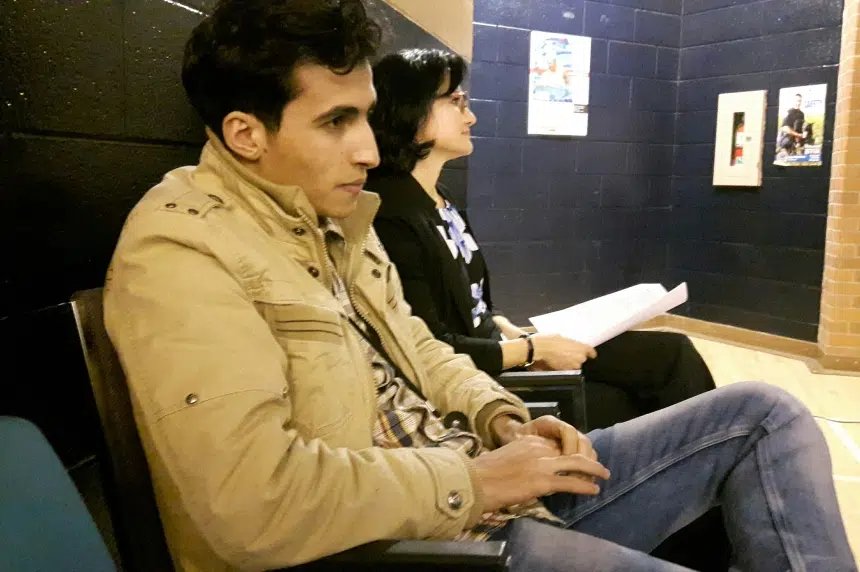A young Syrian refugee in Regina is offering teenagers a chance to see and understand his experience through his passion for photography.
Hany Al Moulia was happy when he was invited to share his story with students at Winston Knoll Collegiate because he was a teenager when the war began in Syria.
“I was the same – their age – and I wasn’t thinking about this, I wasn’t thinking about leaving my country and I wasn’t thinking about losing my education,” he said.
While he highlights experiences that are hard for most Canadians to imagine, it is the similarities in his life that he wants people to consider. His father was a farmer who was proud to support his family. His mother had a big kitchen and he had a big bedroom. He was in a band but planned to study engineering in university.
His plans were cut short when the violence began to escalate. The Syrian government cracked down on those who protested the regime, and the rebels fought back with more violence. Caught in the middle, like millions of others, he and his family were forced to flee the country in 2012 when they landed in a refugee camp in Lebanon.
“When I become a refugee in that camp I tried to convince myself that it’s going to be like months and I’m going to be back home, but the problem was that we didn’t see any solution in the horizon,” he said.
Al Moulia said it is hard for them to accept that it has been five years without peace in Syria.
“For me I lost my cousins and I lost a lot of my friends and my relatives and even some people that I really love,” he explained. “It was hard to accept that but in Syria it is normal, it is become normal because the killing is every day.”
While he was living in a refugee camp, Al Moulia saw many photographers from around the world, and decided to start documenting his own experience.
“For me I lost my cousins and I lost a lot of my friends and my relatives and even some people that I really love,” he explained. “It was hard to accept that but in Syria it is normal, it is become normal because the killing is every day.”
Although he and his family have the chance to start over, he doesn’t want anyone to forget about their time in a refugee camp or what is happening in Syria, and that is why he wants to share his photos.
“It’s a good opportunity for me, myself, to understand other people and to share this because I feel responsible now to share that,” he said.
Al Moulia points out that you can’t just go to Google and get all the answers about what is happening in Syria. You should hear it from someone who lived through it, that’s why he will answer any questions.
After three years in the camp, Al Moulia and his family came to Canada as refugees through the United Nations Refugee Council. They landed in Regina.
“It was such a big happy feeling because I feel that I am getting my life back now,” he said.
He is proud to be in Canada, a place that he believes is welcoming to people of all cultures who want to live in peace. He said it is wonderful to start feeling like a human being again.
When he sees negative comments about refugees online, he ignores them because he said those people can’t really imagine or think about the reality, so they just argue and try to create a stir. Although he doesn’t try to argue with people online, Al Moulia said he does feel responsible to help others understand the experience of refugees.
“We are not people coming from the moon, you know, we are just human beings who had everything, but we lost it for some reason,” he said. “It’s not just about Syria it’s about the whole world now.”
Looking back on the past five years, Al Moulia said it is like he lived three different lives, from his normal life in Syria, to his time in a refugee camp, and now getting a fresh start in Regina. After eight months in the Queen City, he is taking English classes thanks to donors from the University of Regina and he hopes to eventually study engineering here.
He admits he is lucky, because he managed to teach himself English, but his parents are still struggling with the language and that makes everything harder.
He said the refugees he meets now have lost everything, but what they miss the most is friendship.
“We need friends, we need people who are just being happy and smiling and you know, give us a chance to be ourselves again and get that life that we used to have,” he said. “We are educated and skilled, we just need to know how it works here and everybody will be fine.”







